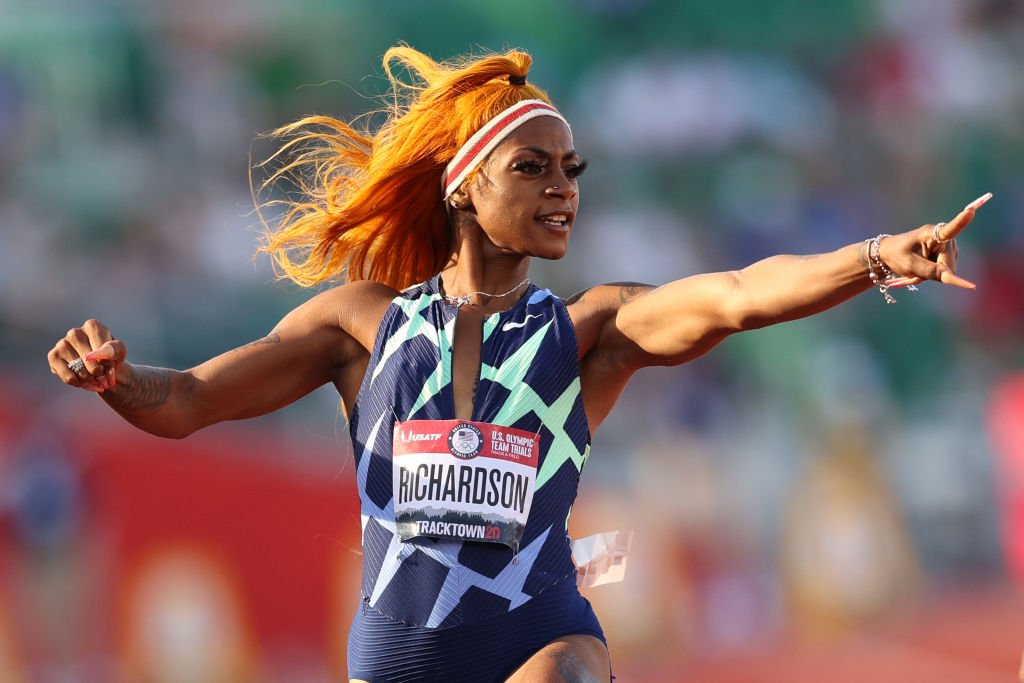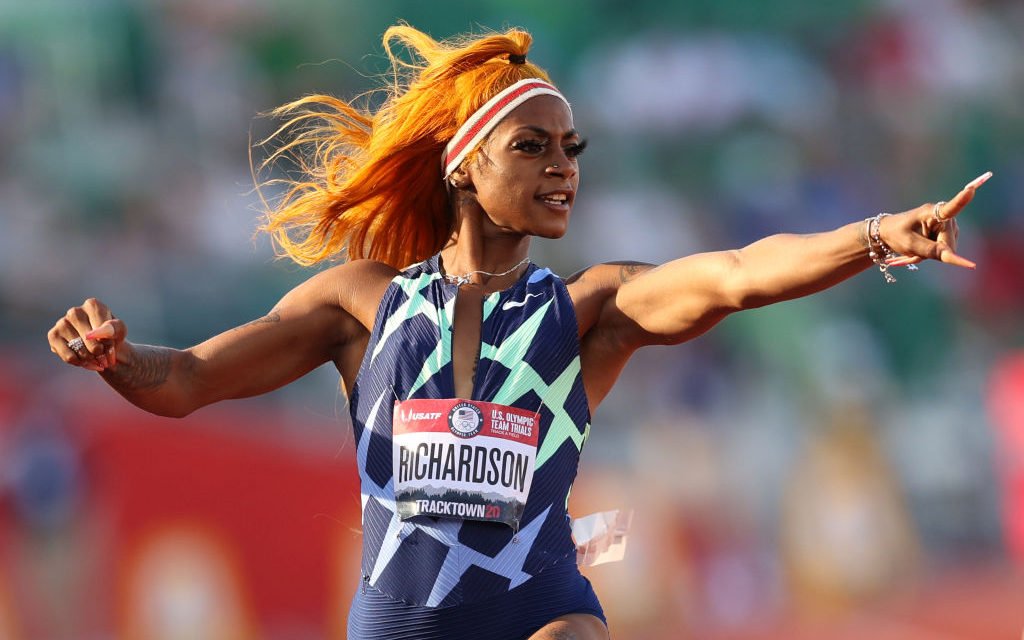
If you have been following some of the coverage leading up to the upcoming Tokyo Olympics, you may have heard several stories around rules that disproportionately impact Black and Brown athletes. There was the suspension of sprinter Sha’Carri Richardson for marijuana usage, criticism toward hammer thrower Gwen Berry for her peaceful protest, the ineligibility of two teenage Namibian sprinters due to naturally high testosterone levels, and the governing body for aquatic sports refusing to approve the using of swimming caps designed especially for Black swimmers. These incidents show that sports policies do not consider athletes of color and actively dehumanize Black women and girls’ experiences.
On Sha’Carri Richardson
This is the situation I hesitated most about discussing. I do believe that Richardson did indeed break a rule, a rule that she was aware was in place. She made the decision to use marijuana to cope with the grief around the recent passing of her mother (which she found out from a reporter during an interview). For me this brings up two important issues: one, we have not adequately acknowledged nor prioritized the mental health of our Black women and girls; and two, we must address and interrogate the social stigma around marijuana that disproportionately impacts the Black and Brown community.
We have not prioritized the mental health of our Black women and girls, and we must address and interrogate the social stigma around marijuana that disproportionately impacts the Black and Brown community. Share on XAs we saw with Naomi Osaka at the French Open, the sports community would rather see us continue to provide entertainment than tend to our mental well-being. In a conversation with a friend about the situation they said, “If I paid to see Osaka play, I would be mad.” While I get that, at the same time I ask, “But what about her well-being?” Back to Richardson, she has shared that learning of her mother’s death put her in “a state of emotional panic.” Richardson said in an interview after the suspension, “To put on a face, to have to go in front of the world and put on a face and hide my pain — like, who are you, or who am I, to tell you how to cope?” Research has shown that patients have benefited from marijuana in treating mental illness, including post-traumatic stress disorder.
This situation opens a broader conversation around the stigma and disproportionate punishment of Black and Brown people when it comes to marijuana – at a time when marijuana is becoming legal across the country. A 2020 ACLU report revealed that Black people are 3.64 times more likely than white people to be arrested for marijuana possession despite comparable marijuana usage rates.
Richardson was suspended for 30 days after her positive test result but still was eligible to be placed on the U.S. relay team roster because her 30-day suspension would end before the start of the relay event. However, when the relay roster list was released, Richardson’s name was not on it. I wonder if bias played a role in this decision.
(Note, July is BIPOC Mental Health Awareness Month, find resources here.)
Gwen Berry
Hammer thrower Gwen Berry received backlash and criticism when she turned her back on the American flag as the U.S. national anthem was played during her medal ceremony at the U.S. Olympic trials. Berry, a racial justice activist, said that the playing of the anthem during the award ceremony felt like a “set-up” because athletes had been told the anthem would be played either before or after the medal ceremony – not during. “They said they were going to play it before we walked out, then they played it when we were out there,” Berry said. “But I don’t really want to talk about the anthem because that’s not important. The anthem doesn’t speak for me. It never has.“ Berry further went on to explain that if you read the words of the full anthem, not just what we typically hear or sing, the third verse “speaks about slaves and our blood being slang and pilchered (sic) all over the floor. It’s disrespectful and it does not speak for Black Americans.”
Berry’s peaceful protest drew backlash from conservatives who called for her removal from the U.S. Olympic Team. “We don’t need any more activist athletes,” Rep. Dan Crenshaw (R-Texas) said during an appearance on Fox News’ “Fox and Friends.” “She should be removed from the team. The entire point of the Olympic team is to represent the United States of America. It’s the entire point.” While it is true that the team represents America at the Olympics, it does not mean that they are to do so without criticism of Her. In the past, athletes have been punished for protesting at the Olympics, however the USOPC decided in December to not punish those who peacefully protest or demonstrate at the Tokyo Olympics (bravo!).
Beatrice Masilingi and Christine Mboma
Eighteen-year-old Namibian track and field stars, Beatrice Masilingi and Christine Mboma, were both banned from competing in the 400-meter race at the Tokyo games because their natural testosterone levels were too high. The World Athletics, the international governing body for track and field, deemed the two ineligible to complete because their testosterone level is above the allowable threshold. Women – and only women – whose natural testosterone levels exceed the threshold set by the Worth Athletics are barred from events between 400-meter and one mile. They have two options which World Athletics says will ensure fair competition: lower their testosterone level, or switch events even if it places them at a competitive disadvantage. In order to reduce testosterone levels, athletes would need to take medication.“I would ruin the way my body develops because that’ll be something that rearranges everything – how my body functions and everything,” says Masilingi. Mboma and Masilingi both opted to drop down to the 200-meter event.
This injustice not only dehumanizes the bodies of Mboma and Masilingi, but it also risks stigmatizing their reputations as athletes. It is common for people to associate terms like “testosterone” and “permissible limit” with intentional, illegal doping and assign them the label of “cheater,” which may follow them into the future. Black women deserve better.
Black women deserve better. Share on XBanned Swim Caps
A Black-owned UK-based company designed special made swim caps specifically for Black swimmers with longer, thicker and more voluminous hair for use at the upcoming Olympic games. These caps were deemed “unsuitable”’ by the International Swimming Federation (FINA). The Soul Cap, designed with natural Black hair in mind, is an extra-large sized cap designed for people with thick and curly hair, braids and locs that don’t’ fit in standard size swimming caps.
The reason for the banning of the caps according to FINA is that they did not fit “the natural form of the head” and to the best of their knowledge, “the athletes competing at the international events never used, neither require to use, caps of such size and configuration.” Perhaps because before this there was nothing available that accounted for the diversity of Black hair styles for swimmers to use. Following the decision to ban the caps, Toks Ahmed co-founder of Soul Cap stated in an Instagram post that FINA’s decision could “discourage many younger athletes from pursuing the sport as they progress through local, county and national competitive swimming.”
It is clear that this ban is due to the lack of knowledge and understanding about Black hair and the continued pattern of punishing Black women and men for their hairstyles. Many Black woman and girls avoid swimming because of the damage to their hair, which makes these types of special caps vital. This could also contribute to the lack of diversity in competitive swimming – which is why FINA may have not, until now, seen a desire for athletes to wear such caps in previous competitions.
Martiza McClendon, a 2004 Olympic silver medalist and the first Black woman to join a U.S. Olympic swim team shared on Good Morning America, “The undertone behind what their decision was speaks beyond the cap. You’re basically saying that Black swimmers aren’t at the elite level, and they don’t really need a cap that works best for them.”
On July 2, FINA released a media statement saying they were reviewing the ban on the Soul Cap swim caps, no decision has been made to date to reverse the ban.
As you learned from our recent Operationalizing Justice series, here at The Winters Group, we take an approach that centers justice by examining who is most harmed, and who most benefits from the rules and structures that are in place. More often than not, those rules and systems benefit the dominant or normative culture. We also know that in order to have justice and equity in these structures those most harmed by inequitable systems need to be integral in the development of the solutions and rules that are in place. I have no details on the demographic make-up of those who sit on the committees and governing bodies that make rules for Olympian athletes, but I would assume that they lack BIPOC representation. (I can say most assuredly that if there was a Black woman as part of the group that ruled on the swim caps, they would not have been banned!) Through these institutionalized actions, the committees are actively blocking Black women from winning at the Olympics.
Through these institutionalized actions, the committees are actively blocking Black women from winning at the Olympics. Share on X


















